1. Overview
Luís Filipe Madeira Caeiro Figo, born on 4 November 1972, is a Portuguese former professional footballer widely regarded as one of the best players of his generation and one of the greatest wingers in the history of the sport. He played as a winger for several prominent clubs including Sporting CP, FC Barcelona, Real Madrid CF, and Inter Milan. Figo earned 127 caps for the Portugal national team, a record at the time, though later surpassed by Cristiano Ronaldo.
His illustrious career is highlighted by numerous trophy wins, including the Portuguese Cup, four La Liga titles, two Spanish Cups, three Spanish Super Cups, one UEFA Champions League title, one UEFA Cup Winners' Cup, two UEFA Super Cups, one Intercontinental Cup, four Serie A titles, one Italian Cup, and three Italian Super Cups. Individually, he won the 2000 Ballon d'Or and the 2001 FIFA World Player of the Year award. In 2004, Pelé included him in the FIFA 100 list of the world's greatest living players. Figo is notable for being one of the few players to have represented both rival Spanish clubs, Barcelona and Real Madrid. His controversial transfer in 2000 from Barcelona to Real Madrid for a world record fee of 62.00 M EUR became a defining moment in the intense El Clásico rivalry.
2. Early Life and Background
Luís Figo's early life was shaped by his family background and initial forays into football in Portugal.
2.1. Childhood and Education
Luís Filipe Madeira Caeiro Figo was born on 4 November 1972, the only child of António Caeiro Figo and Maria Joana Pestana Madeira. His parents had moved from Alentejo to Lisbon in the early 1970s. Figo grew up in the working-class district of Cova da Piedade, Almada. He began his football journey as a street footballer at a local club called Os Pastilhas. At the age of 11, he joined the academy of Sporting Clube de Portugal. His academic excellence was such that the agreement for his enrollment at the academy reportedly included a clause requiring him to focus on football. In his youth, Figo also played futsal, which significantly contributed to the development of skills that would later prove invaluable in his professional career. While at Sporting, before his move to Barcelona, he completed the 11th grade of formal education. He later finished secondary school (12th grade) in Portugal at the age of 38, in 2011, through the special New Opportunities (Novas OportunidadesPortuguese) skills certification program for adults. He also pursued further education by studying business management through a nine-month course at IESE in Madrid.
3. Club Career
Luís Figo's club career spanned across Portugal, Spain, and Italy, where he achieved significant success and became one of the most recognized footballers of his era.
3.1. Sporting CP
Figo began his professional career at Sporting CP. He made his league debut on 2 April 1990 during the 1989-90 season, coming on as a substitute for Marlon Brandão in a 1-0 home victory against Marítimo. His first goal for the club came on 7 December 1991, in the 1991-92 season against Torreense, an equalizer in a match Sporting won 2-1. During his tenure at Sporting, Figo was recognized for his burgeoning talent, being named the Primeira Liga Best Player in 1994 and the Portuguese Player of the Year in 1995. In his final season with Sporting, he secured his first major senior trophy, winning the 1994-95 Portuguese Cup.
3.2. Barcelona
In 1995, Figo attracted interest from several major European clubs. He famously signed contracts with both Italian giants Juventus and Parma, leading to a dispute between the two clubs. As a result, Figo faced a two-year transfer ban in Italy. This situation ultimately paved his way to Spanish giants Barcelona for a fee of 2.25 M GBP. Due to a rule prohibiting Portuguese players from signing for foreign clubs outside a fixed period, he was initially loaned back for the remainder of the season. This rule had previously prevented him from joining English club Manchester City, where his former Sporting manager Malcolm Allison had recommended him for a fee of around 1.20 M GBP.
It was at Barcelona that Figo's career truly flourished. He became a pivotal player, winning the 1996-97 UEFA Cup Winners' Cup alongside Ronaldo. This was followed by successive Primera División titles, where he formed a formidable attacking trio with Rivaldo and Patrick Kluivert. In total, Figo made 172 league appearances for Barcelona, scoring 30 goals. He was revered in Barcelona and the Catalan region, with his presence giving the region a sense of external validation. He became an idol, captain, and symbol for the club's fanbase.
3.3. Real Madrid
In July 2000, Figo made a surprising and highly controversial move to Barcelona's bitter rivals, Real Madrid, for a world record fee of 62.00 M EUR. Real Madrid met the buyout clause in his Barcelona contract, and his arrival signaled the beginning of Florentino Pérez's "Galácticos" era, characterized by the annual signing of global football stars. This transfer ignited an intense rivalry between the two clubs, with Barcelona fans feeling deeply betrayed by Figo's departure. Banners with messages like "Traitor," "Judas," "Scum," and "Mercenary" were displayed around the Camp Nou.
When Figo returned to the Camp Nou for the first time in a Real Madrid shirt on 21 October 2000, the noise was deafening. He was relentlessly taunted, and as he ran onto the field, the jeers from almost 98,000 Barcelona fans escalated, prompting a visibly shocked Figo to put his fingers to his ears. During the match, every time Figo touched the ball, the noise intensified, accompanied by a shower of missiles, including oranges, bottles, cigarette lighters, and mobile phones. As Real Madrid's regular corner taker, Figo avoided taking corners at the Camp Nou to minimize proximity to the hostile crowd. Barcelona won the match 2-0, with Real Madrid President Florentino Pérez later commenting, "The atmosphere got to us all." Madrid defender Iván Campo remarked on the intensity of the night, stating, "That night when Figo first went back was incredible. I've never heard anything like it. Luís didn't deserve that. He'd given his all for Barcelona. It was built up before: 'a traitor's coming,' the media said. No, Luís Figo is coming, one of the greats for you. That night hurt him, you could see. His head was bowed and he was thinking: 'bloody hell, I was here last season ...' But my lasting emotion was admiration: you've got balls."
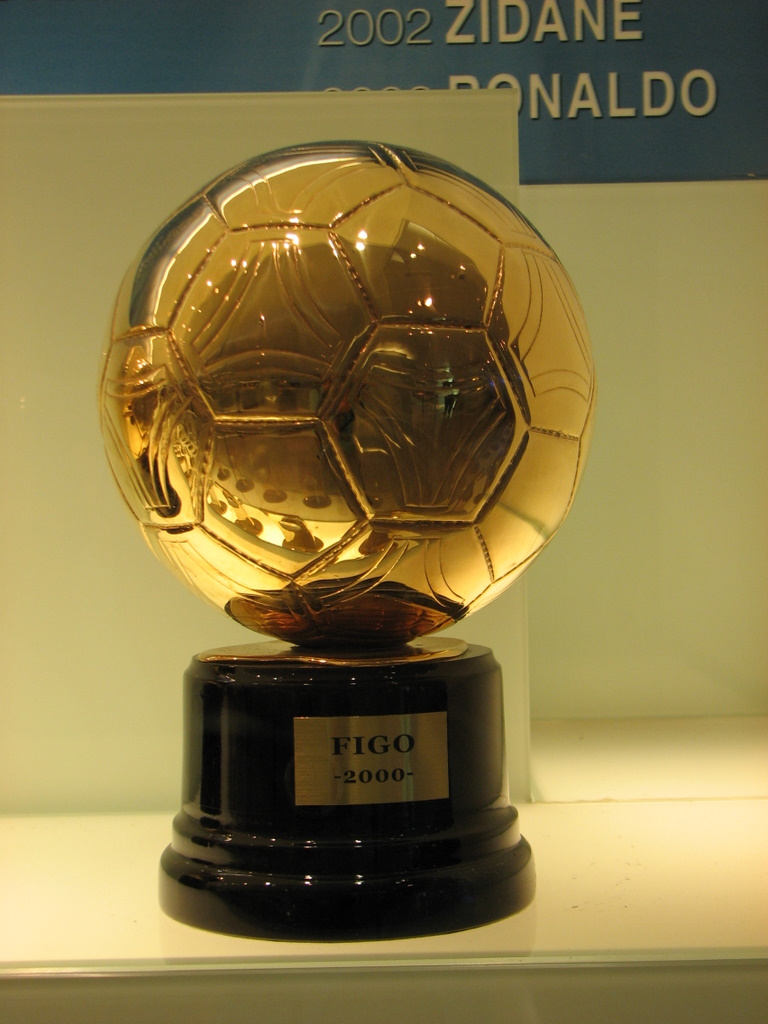
Figo's second game back at the Camp Nou, on 23 November 2002, produced one of the most iconic images of the Barcelona-Real Madrid rivalry. The animosity showed no signs of subsiding, and objects continued to rain down whenever he approached the Barcelona fans. Figo expressed concern, stating, "I was worried that some madman might lose his head." This time, Figo decided to take corners and throw-ins. Midway through the second half, when Madrid won a corner, it took Figo two minutes to take it amidst a barrage of flying objects. When another corner was awarded on the opposite side, Figo deliberately slowed down, picked up some of the debris, and ironically gave a thumbs-up and smiled as he prepared to take the kick. Each time he began his run-up, another missile would land, a cycle that repeated until referee Luis Medina Cantalejo suspended the game for almost 20 minutes. During this break, a pig's head was famously captured on camera among the debris near the corner flag.
Despite the intense pressure and animosity, Figo had a successful spell at Real Madrid. In his first season, he won the 2001 La Liga title, scoring 14 goals across all competitions. For his outstanding performances, he was named the 2001 FIFA World Player of the Year. In mid-2001, he was joined by Zinedine Zidane, and in the subsequent season, Madrid clinched the 2001-02 UEFA Champions League title. Figo missed two fixtures against Barcelona during this period due to injury and suspension. He spent five seasons at Madrid, with his final major success being the 2003 La Liga title. In April 2013, the Spanish sports newspaper Marca named Figo as a member of the "Best foreign eleven in Real Madrid's history".
Figo later clarified that his departure from Barcelona was not primarily for money but due to a perceived lack of appreciation from the club. Despite the controversy, he stated he had no regrets about his decision to join Real Madrid, even if it meant being seen as a "villain" by Barcelona fans.
3.4. Inter Milan
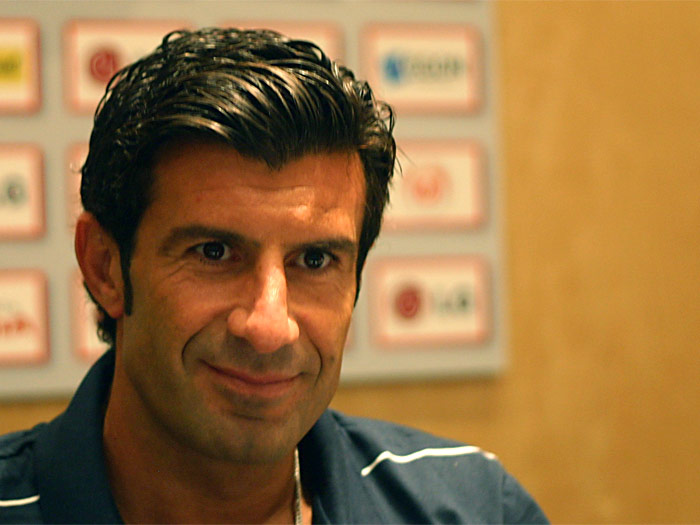
Figo left Real Madrid to join the Italian club Inter Milan in mid-2005 on a free transfer after his contract with Madrid expired. This move allowed Figo to finally play for a club in Italy, a possibility that had been thwarted earlier in his career due to the dispute between Juventus and Parma. In mid-2008, Figo's compatriot José Mourinho joined Inter as manager, a development that reportedly pleased Figo, as it meant he would have several Portuguese teammates during his remaining time at the club.
On 16 May 2009, Figo announced his retirement from football, coincidentally on the same day Inter secured the 2008-09 Serie A title. He re-confirmed his retirement on 30 May. His final professional game was on 31 May against Atalanta at the San Siro. At the insistence of his teammate Javier Zanetti, Figo captained the side for his last match. He received a standing ovation from the crowd as he was substituted by Davide Santon. His most memorable moment in Italy was a free-kick he scored in extra time against Roma during the 2006 Supercoppa Italiana.
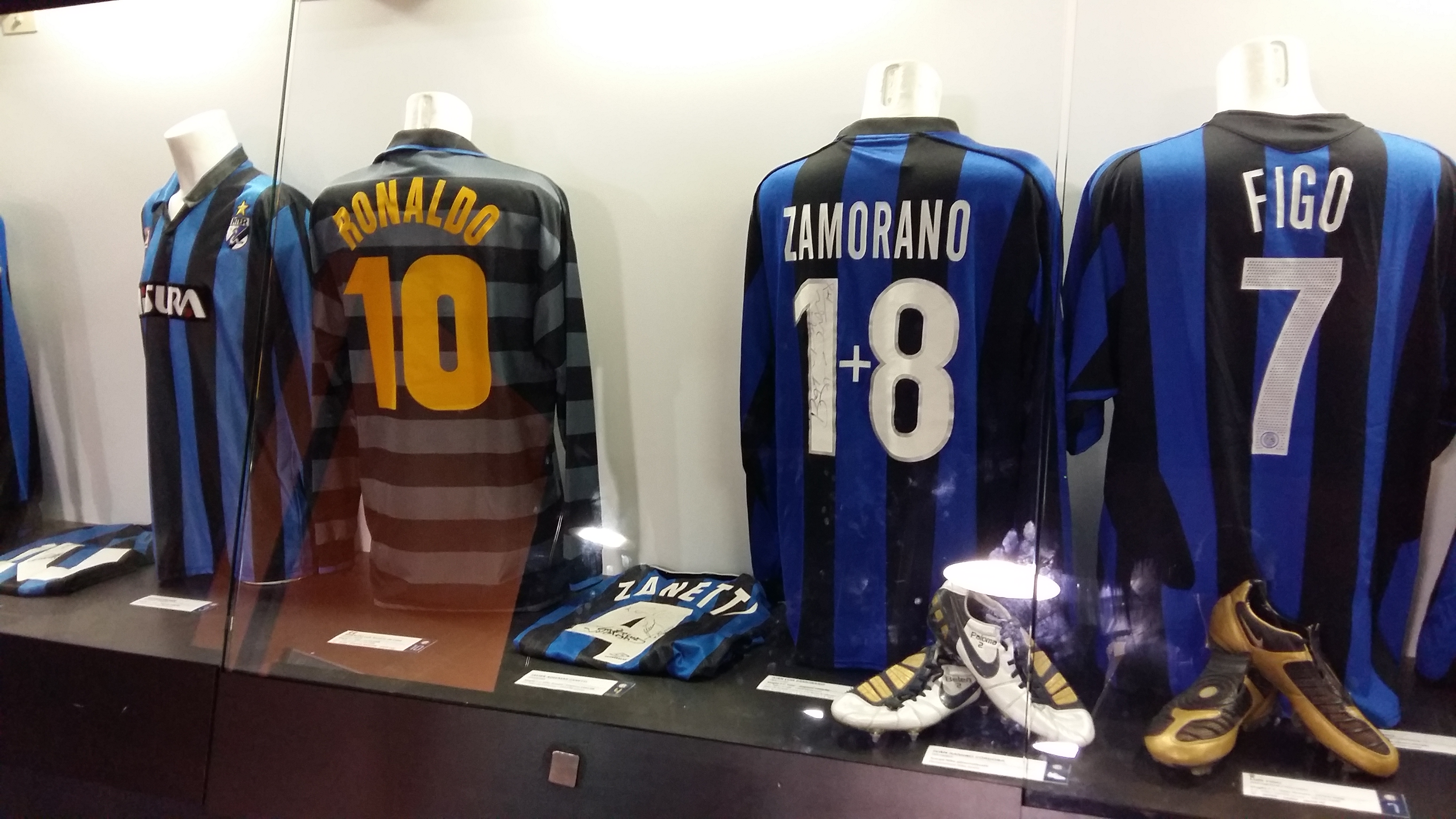
Upon his retirement, Figo stated, "I am leaving football, not Inter." In an interview with Inter Channel after his final game, he expressed his hope to continue contributing to the club's growth, stating, "I will certainly work for Inter in the future on the club board. I never imagined that I was going to remain here for such a long time. What I will never forget is the love that I have received since my first day here from my teammates and president Massimo Moratti. I will never forget it; Inter has given me the chance to start a winning cycle with some extraordinary people." Figo was present on the sidelines when Inter won the 2009-10 UEFA Champions League on 22 May 2010.
4. International Career
Luís Figo's international career saw him rise through the youth ranks to become a central figure for the Portugal national team, leading their "Golden Generation" to notable successes in major tournaments.
4.1. Portugal Youth Teams
Figo was a prominent member and leader of Portugal's "Golden Generation" of footballers. He achieved early international success with Portugal's youth squads, winning the UEFA European Under-16 Championship in 1989. Two years later, he was part of the team that clinched the FIFA World Youth Championship in 1991. During these formative years, he played alongside other future stars like Rui Costa and João Pinto, forming the core of what would become a celebrated era for Portuguese football.
4.2. Portugal National Team
Figo made his senior international debut for Portugal on 16 October 1991, at just 18 years old, in a friendly match against Luxembourg that ended in a 1-1 draw. His first goal for the national team came on 11 November 1992, an equalizer in a 2-1 friendly victory over Bulgaria in Paris.
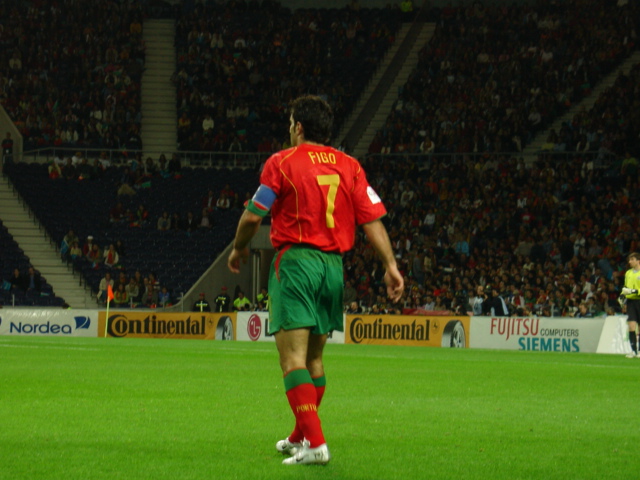
He played a crucial role in Portugal's qualification for UEFA Euro 1996, scoring three goals in eight qualifying games, as the country reached the continental tournament for the first time in 12 years. In the final group game of the tournament, against Croatia at the City Ground in Nottingham, Figo opened the scoring in a 3-0 victory that saw Portugal advance to the quarter-finals as group winners.
Figo featured in all ten of Portugal's qualifiers for UEFA Euro 2000, scoring three times. In their opening game of the tournament in Eindhoven on 12 June 2000, he scored Portugal's first goal as they came from behind to beat England 3-2, again advancing as group winners before being eliminated in the semi-finals. He was rested by coach Humberto Coelho for the final group match against Germany in Rotterdam, which ended a streak of 32 consecutive international appearances. His only hat-trick for the national team occurred on 15 August 2001, when he netted all three goals in a 3-0 friendly victory over Moldova at the Estádio de São Luís in Faro.
With six goals in nine matches, Figo was instrumental in helping Portugal qualify for the 2002 FIFA World Cup. On 2 June 2001, in a qualifier against the Republic of Ireland at Lansdowne Road, he served as captain for the first time on his 74th cap and scored the equalizer in a 1-1 draw. In their first World Cup appearance since 1986, Portugal suffered group stage elimination, and Figo failed to score a goal in the tournament. During the match against South Korea, he was closely marked by players like Lee Young-pyo.

On 18 February 2004, Figo earned his 100th cap in a 1-1 friendly draw with England at the Estádio Algarve, playing as captain despite regular skipper Fernando Couto being in the starting lineup. Later that year, at UEFA Euro 2004 on home soil, he captained the side after Couto was dropped. He announced his retirement from international football following the Euro 2004 final upset defeat by Greece. While an alleged rift between him and national coach Luiz Felipe Scolari was cited, this was later denied. Notably, during the Euro 2004 final, a Barcelona fan named Jimmy Jump ran onto the field and threw a Barcelona flag in Figo's face, symbolizing the enduring animosity from his controversial club transfer. In June 2005, Figo reversed his decision and returned for the 2006 World Cup qualifying wins against Slovakia and Estonia under Scolari.
Figo captained the squad during the 2006 FIFA World Cup, leading the team to the semi-finals. With three wins, Portugal finished top of their group and qualified for the knockout rounds alongside Mexico. They advanced past the Netherlands in the last 16 and defeated England on penalties in the quarter-final. Figo did not take part in the shootout, having been substituted for Hélder Postiga. In the semi-final, Portugal was beaten by France courtesy of a penalty from his former club-mate and French captain Zinedine Zidane. This marked Portugal's best World Cup finish in 40 years. The third-place playoff against hosts Germany caused some controversy as Figo did not start, with Pauleta captaining the team in his place. However, with Portugal trailing 2-0, Figo replaced Pauleta in the 77th minute, who handed him back the captain's armband to cheers from both Portuguese and German fans. Although Germany scored another goal shortly after Figo's entrance, he ended his final cap for his country on a high note by setting up Nuno Gomes to head in an 88th-minute consolation goal, symbolically passing his number 7 jersey down to his successor, Cristiano Ronaldo.
Despite the "Golden Generation" not winning any major international trophies, Figo successfully captained the team to their best World Cup performance since the Eusébio era in 1966, and helped Portugal achieve their best-ever result in the UEFA European Championship until they won it in 2016. He concluded his international career with 127 caps and 32 goals, holding the record for most appearances with the Portugal national team until June 2016. He remains Portugal's fourth-highest all-time goalscorer.
5. Playing Style
Luís Figo is widely regarded as one of the best players of his generation and one of the greatest wingers in the history of football. At his physical peak, he was a quick, elegant, and highly skillful player known for his close control, acceleration, and exceptional dribbling ability, which allowed him to frequently take on and beat defenders in one-on-one situations. He often employed feints to bypass opponents, such as stepovers. Although naturally right-footed, he was capable of using either foot effectively.
Figo was typically deployed as a winger in the early stages of his career, particularly on the right flank. From this position, he was adept at providing numerous assists, often delivering precise curling crosses to teammates. He also possessed the versatility to cut inside, drift onto the left wing, or link up with midfielders, consistently creating goalscoring opportunities. He holds the record for the second-most assists in La Liga history, with 106, a feat surpassed only by Lionel Messi.
As his career progressed and he lost some of his initial pace and mobility, Figo transitioned into a playmaking role as an attacking midfielder. This was particularly evident during his time with Inter Milan, where he excelled with his exceptional vision, tactical intelligence, and varied passing range. While primarily serving as a creative force, Figo also contributed offensively with goals, thanks to his powerful striking ability from distance and his accuracy from both free-kicks and penalties. Beyond his technical and tactical prowess, Figo was also highly respected for his strong leadership qualities throughout his career.
6. Media and Other Activities
Beyond his on-field achievements, Luís Figo has been involved in various media ventures, administrative roles, and charitable initiatives.
6.1. Commercials and Video Games
Figo has frequently appeared in commercials for the sportswear company Nike. In 1996, he starred in a notable Nike commercial titled "Good vs Evil," set in a Roman amphitheatre. In this advertisement, he appeared alongside other global football stars such as Ronaldo, Paolo Maldini, Ian Wright, Eric Cantona, Patrick Kluivert, and Jorge Campos, defending "the beautiful game" against a team of demonic warriors, culminating in Cantona's decisive strike that vanquished evil.
In a global Nike advertising campaign leading up to the 2002 FIFA World Cup in Korea and Japan, Figo featured in the "Secret Tournament" commercial (branded by Nike as "Scorpion KO"). Directed by Terry Gilliam, this advertisement showcased Figo alongside other prominent footballers like Thierry Henry, Ronaldinho, Francesco Totti, Roberto Carlos, and Japanese star Hidetoshi Nakata, with former player Eric Cantona serving as the tournament's "referee."
Figo has also been a prominent figure in EA Sports' FIFA video game series. He was included in the Ultimate Team Legends in FIFA 14. In 2015, the arcade game company Konami announced that Figo would feature in their football video game Pro Evolution Soccer 2016 as one of the new myClub Legends. In 2018, Figo was added as an icon to the Ultimate Team in FIFA 19. He has also participated in several Iranian television shows, such as Navad TV during the 2018 World Cup draw, alongside Hamid Estili and former Hamburg player Mehdi Mahdavikia. In August 2022, Netflix released El Caso Figo (The Figo Affair), a documentary detailing Figo's controversial transfer from Barcelona to Real Madrid.
6.2. FIFA Presidency Campaign
On 28 January 2015, Figo publicly announced his intention to run against then-incumbent Sepp Blatter for the position of FIFA president. His candidacy garnered support from notable figures, including his former manager José Mourinho and former teammate David Beckham. In his manifesto, Figo expressed support for expanding the World Cup to a 48-team finals tournament and pledged greater investment in grassroots football and national federations. Despite his platform, he was considered an outsider compared to Blatter and the other two candidates, Michael van Praag and Prince Ali bin Hussein. Figo ultimately withdrew from the election campaign on 21 May, stating that he did not wish to be part of a process that seemed to grant "absolute power" and citing insufficient opportunities for discussion and debate.
6.3. Business and Charity Work
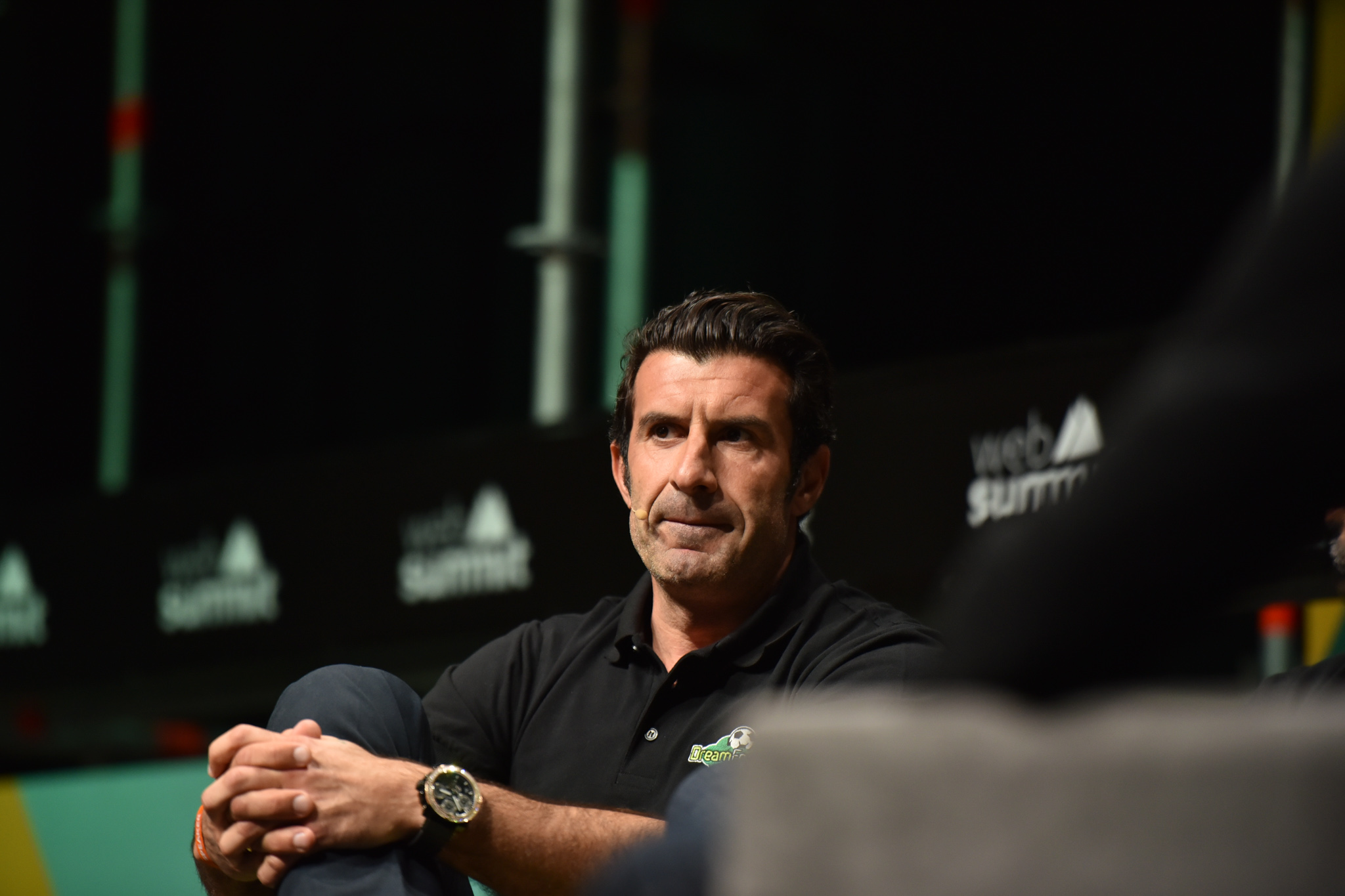
Beyond his football career, Figo has engaged in various business ventures and significant charity work. He serves as an ambassador for the Stop TB Partnership, actively participating in the global fight against tuberculosis. He maintains a close relationship with Inter Milan, acting as an ambassador for the club at various functions across Europe. He is also a board member of the Inter Campus charity project, which is run by Inter Milan.
In 2003, Figo established the Fundação Luís Figo (Luís Figo Foundation) in Portugal. Headquartered in Lisbon, this charity is dedicated to supporting children with special needs and those affected by poverty. The foundation also works to motivate higher education attendance and provides support to families at risk, such as through initiatives like providing a "home" in Oeiras for vulnerable families.
In a different venture, Figo, along with his countryman and former Portugal national team manager Carlos Queiroz, briefly held a joint seat for A1 Team Portugal in A1 Grand Prix during the 2005-06 A1 Grand Prix season. Figo has diversified his business interests, operating in the hotel, fashion, catering, mining, and wine sectors. He is a co-owner of an upscale bar in Vilamoura and a hotel in Carvoeiro, both located in the Algarve region of Portugal. In 2010, a year after retiring from playing, he attended the International Mining Fair in Dakar, Senegal, which inspired him to establish a mining company called Damash Assets, based in Almada, in which his wife is also a partner. Figo is also the founder of Network90, a private members' networking site designed for the professional football industry.
7. Personal Life
Luís Figo is married to Swedish model Helen Svedin. They met at a flamenco dance event and have three daughters: Daniela (born in March 1999), Martina (born in April 2002), and Stella (born on 9 December 2004). The family owns a home near Sollefteå in Sweden.
Figo is fluent in five languages: Portuguese, Spanish, English, Italian, and French. He has also been observed congratulating his wife on her birthday in Swedish on Instagram, although he has not publicly spoken the language in media appearances. Like some of his former Real Madrid teammates, such as Steve McManaman and Roberto Carlos, Figo is a Christian and met with the Pope in 2002.
8. Career Statistics
8.1. Club Statistics
| Club | Season | League | National cup | Europe | Other | Total | ||||||
|---|---|---|---|---|---|---|---|---|---|---|---|---|
| Division | Apps | Goals | Apps | Goals | Apps | Goals | Apps | Goals | Apps | Goals | ||
| Sporting CP | 1989-90 | Primeira Divisão | 3 | 0 | - | - | - | 3 | 0 | |||
| 1990-91 | Primeira Divisão | 0 | 0 | - | - | - | 0 | 0 | ||||
| 1991-92 | Primeira Divisão | 34 | 1 | 2 | 0 | 2 | 0 | - | 38 | 1 | ||
| 1992-93 | Primeira Divisão | 32 | 0 | 5 | 0 | 2 | 0 | - | 39 | 0 | ||
| 1993-94 | Primeira Divisão | 31 | 8 | 6 | 3 | 5 | 0 | - | 42 | 11 | ||
| 1994-95 | Primeira Divisão | 29 | 7 | 5 | 4 | 2 | 0 | - | 36 | 11 | ||
| Total | 129 | 16 | 18 | 7 | 11 | 0 | - | 158 | 23 | |||
| Barcelona | 1995-96 | La Liga | 35 | 5 | 7 | 0 | 10 | 3 | - | 52 | 8 | |
| 1996-97 | La Liga | 36 | 4 | 5 | 3 | 8 | 1 | 1 | 0 | 50 | 8 | |
| 1997-98 | La Liga | 35 | 5 | 6 | 1 | 7 | 1 | 3 | 0 | 51 | 7 | |
| 1998-99 | La Liga | 34 | 7 | 4 | 0 | 6 | 1 | 1 | 0 | 45 | 8 | |
| 1999-2000 | La Liga | 32 | 9 | 4 | 0 | 13 | 5 | 2 | 0 | 51 | 14 | |
| Total | 172 | 30 | 26 | 4 | 44 | 11 | 7 | 0 | 249 | 45 | ||
| Real Madrid | 2000-01 | La Liga | 34 | 9 | 0 | 0 | 14 | 5 | 2 | 0 | 50 | 14 |
| 2001-02 | La Liga | 28 | 7 | 6 | 1 | 11 | 3 | 2 | 0 | 47 | 11 | |
| 2002-03 | La Liga | 33 | 10 | 1 | 0 | 15 | 2 | 2 | 0 | 51 | 12 | |
| 2003-04 | La Liga | 36 | 9 | 6 | 2 | 10 | 2 | 2 | 1 | 54 | 14 | |
| 2004-05 | La Liga | 33 | 3 | 0 | 0 | 10 | 4 | - | 43 | 7 | ||
| Total | 164 | 38 | 13 | 3 | 60 | 16 | 8 | 1 | 245 | 58 | ||
| Inter Milan | 2005-06 | Serie A | 34 | 5 | 3 | 0 | 8 | 1 | - | 45 | 6 | |
| 2006-07 | Serie A | 32 | 2 | 7 | 0 | 7 | 0 | 1 | 1 | 47 | 3 | |
| 2007-08 | Serie A | 17 | 1 | 1 | 0 | 3 | 0 | 1 | 0 | 22 | 1 | |
| 2008-09 | Serie A | 22 | 1 | 0 | 0 | 3 | 0 | 1 | 0 | 26 | 1 | |
| Total | 105 | 9 | 11 | 0 | 21 | 1 | 3 | 1 | 140 | 11 | ||
| Career total | 570 | 93 | 68 | 14 | 136 | 28 | 18 | 2 | 792 | 137 | ||
8.2. International Statistics
| National team | Year | Apps | Goals |
|---|---|---|---|
| Portugal | 1991 | 3 | 0 |
| 1992 | 7 | 1 | |
| 1993 | 5 | 0 | |
| 1994 | 5 | 2 | |
| 1995 | 6 | 1 | |
| 1996 | 9 | 2 | |
| 1997 | 7 | 2 | |
| 1998 | 6 | 0 | |
| 1999 | 9 | 4 | |
| 2000 | 13 | 6 | |
| 2001 | 9 | 9 | |
| 2002 | 10 | 0 | |
| 2003 | 10 | 3 | |
| 2004 | 11 | 1 | |
| 2005 | 7 | 0 | |
| 2006 | 10 | 1 | |
| Total | 127 | 32 | |
9. Honours
Luís Figo's career was marked by a remarkable collection of team and individual accolades across various competitions and clubs.
9.1. Club Honours
Sporting CP
- Taça de Portugal: 1994-95
Barcelona
- La Liga: 1997-98, 1998-99
- Copa del Rey: 1996-97, 1997-98
- Supercopa de España: 1996
- UEFA Cup Winners' Cup: 1996-97
- UEFA Super Cup: 1997
Real Madrid
- La Liga: 2000-01, 2002-03
- Supercopa de España: 2001, 2003
- UEFA Champions League: 2001-02
- UEFA Super Cup: 2002
- Intercontinental Cup: 2002
Inter Milan
- Serie A: 2005-06, 2006-07, 2007-08, 2008-09
- Coppa Italia: 2005-06
- Supercoppa Italiana: 2006, 2008
9.2. International Honours
Portugal
- UEFA European Under-16 Championship: 1989
- FIFA U-20 World Cup: 1991
- UEFA European Championship runner-up: 2004
9.3. Individual Awards
- UEFA European Under-21 Championship Golden Player: 1994
- Portuguese Golden Ball: 1994
- Sporting CP Player of the Year: 1994
- Portuguese Footballer of the Year: 1995, 1996, 1997, 1998, 1999, 2000
- ESM Team of the Year: 1997-98, 1999-00
- La Liga Foreign Player of the Year: 1999, 2000, 2001
- La Liga top assist provider: 1996-97, 1998-99
- Don Balón Best Foreign Player of the Year: 1999
- UEFA European Championship Team of the Tournament: 2000, 2004
- World Soccer Player of the Year: 2000
- Ballon d'Or: 2000
- FIFA World Player of the Year: 2001; silver award: 2000
- UEFA Team of the Year: 2003
- UEFA Champions League top assist provider: 2004-05
- FIFA World Cup All-Star Team: 2006
- Inter Milan Player of the Year: 2006
- FIFA 100
- Golden Foot: 2011, as football legend
- IFFHS Legends
10. Legacy and Evaluation
Luís Figo's legacy in football is defined by his exceptional talent, his role in Portugal's "Golden Generation," and the enduring impact of his controversial club transfer. He is consistently recognized as one of the greatest wingers in the history of the sport, admired for his dazzling dribbling, creative playmaking, and consistent ability to influence matches. His individual accolades, including the Ballon d'Or and FIFA World Player of the Year, underscore his status as a world-class player during his prime.
Figo's leadership, particularly as captain of the Portugal national team, guided his country to some of its best performances in major tournaments, even if they did not culminate in a trophy. His dedication and commitment to the game, even in the face of intense public scrutiny, cemented his reputation as a resilient and determined athlete. The "Figo Affair" - his transfer from Barcelona to Real Madrid - remains one of football's most debated and emotionally charged events, illustrating the deep rivalries and passionate fan culture within the sport. Despite the animosity it generated, Figo continued to perform at the highest level, proving his mental fortitude and solidifying his place as a central figure in the "Galácticos" era. His post-playing career, marked by involvement in business and significant charitable work, further demonstrates his multifaceted impact beyond the pitch.